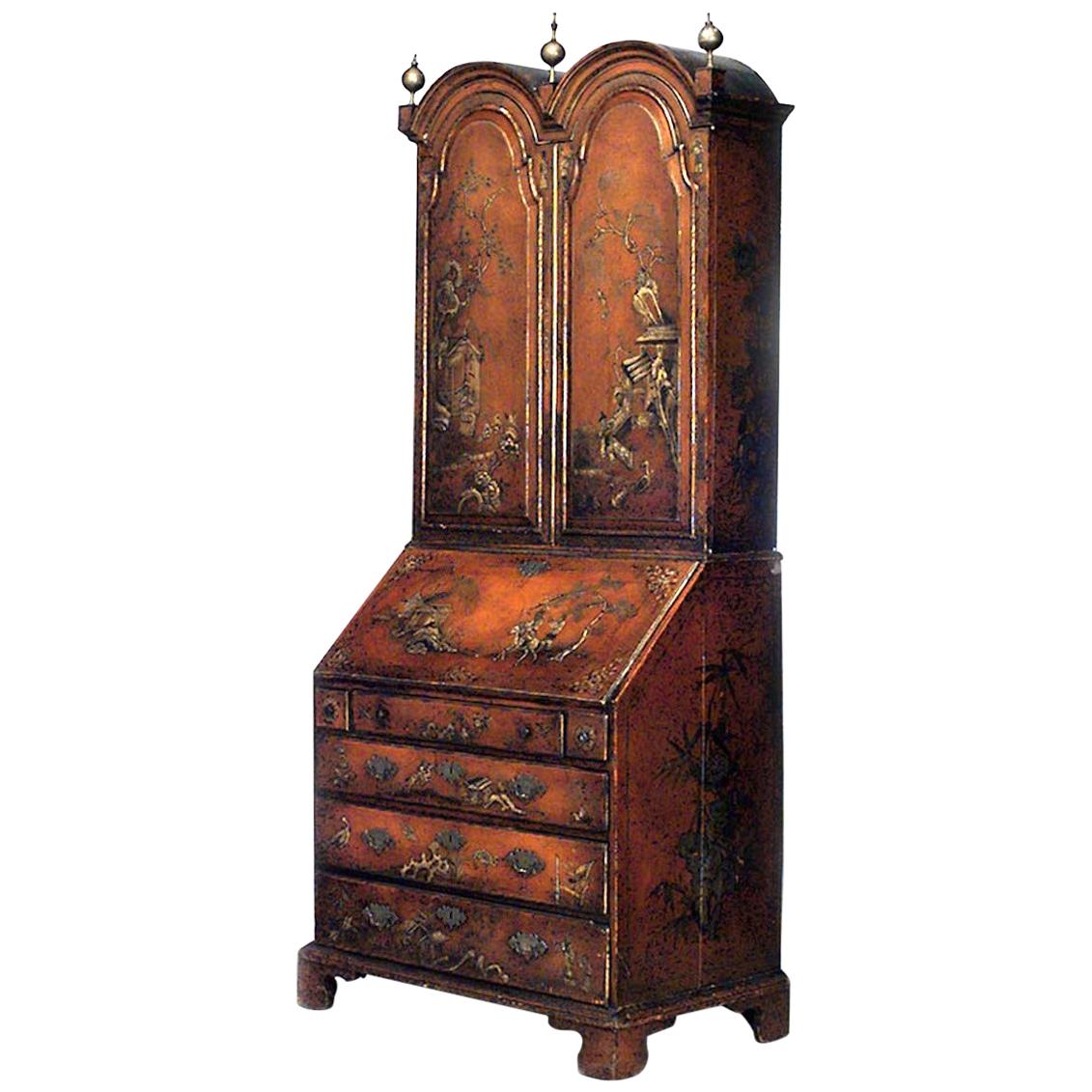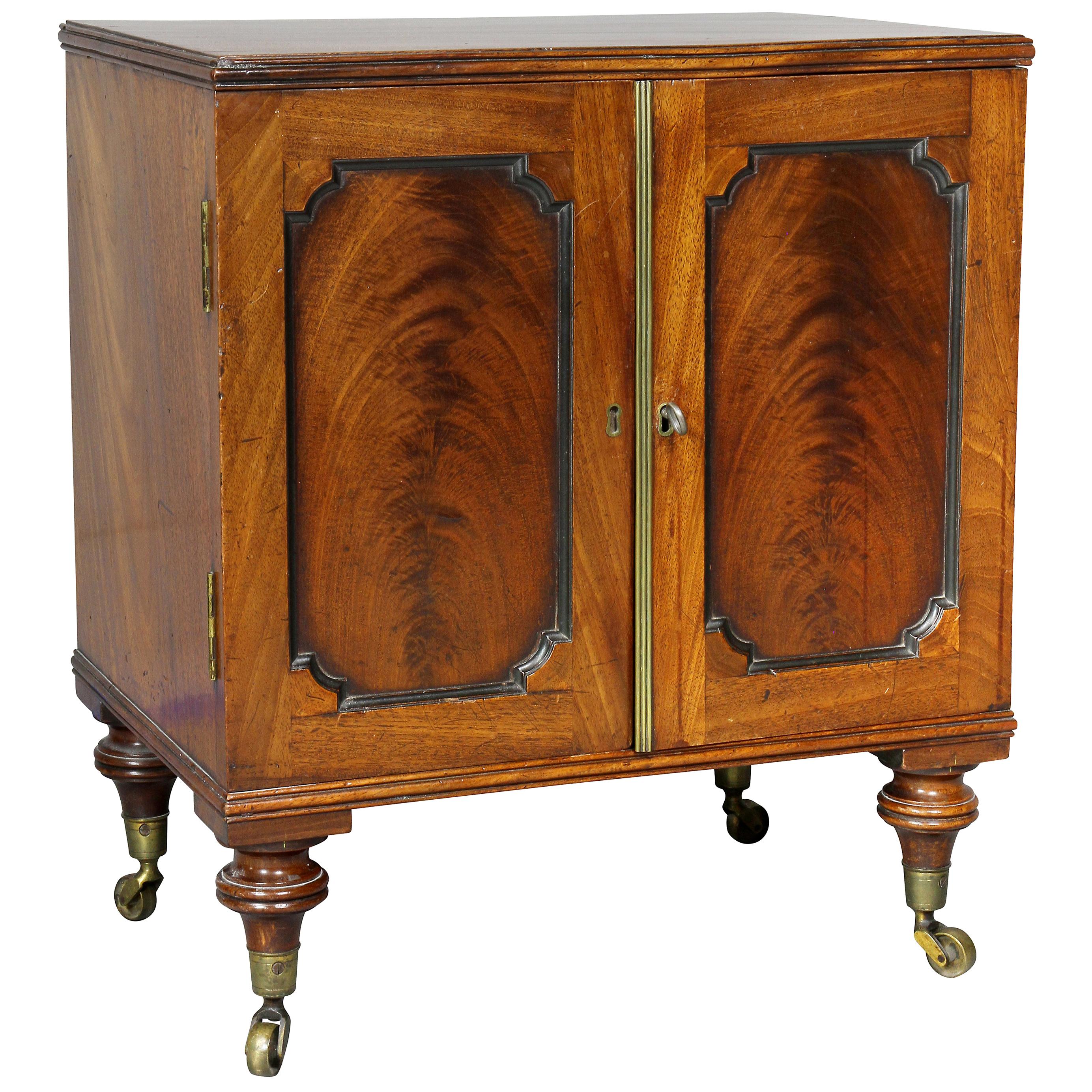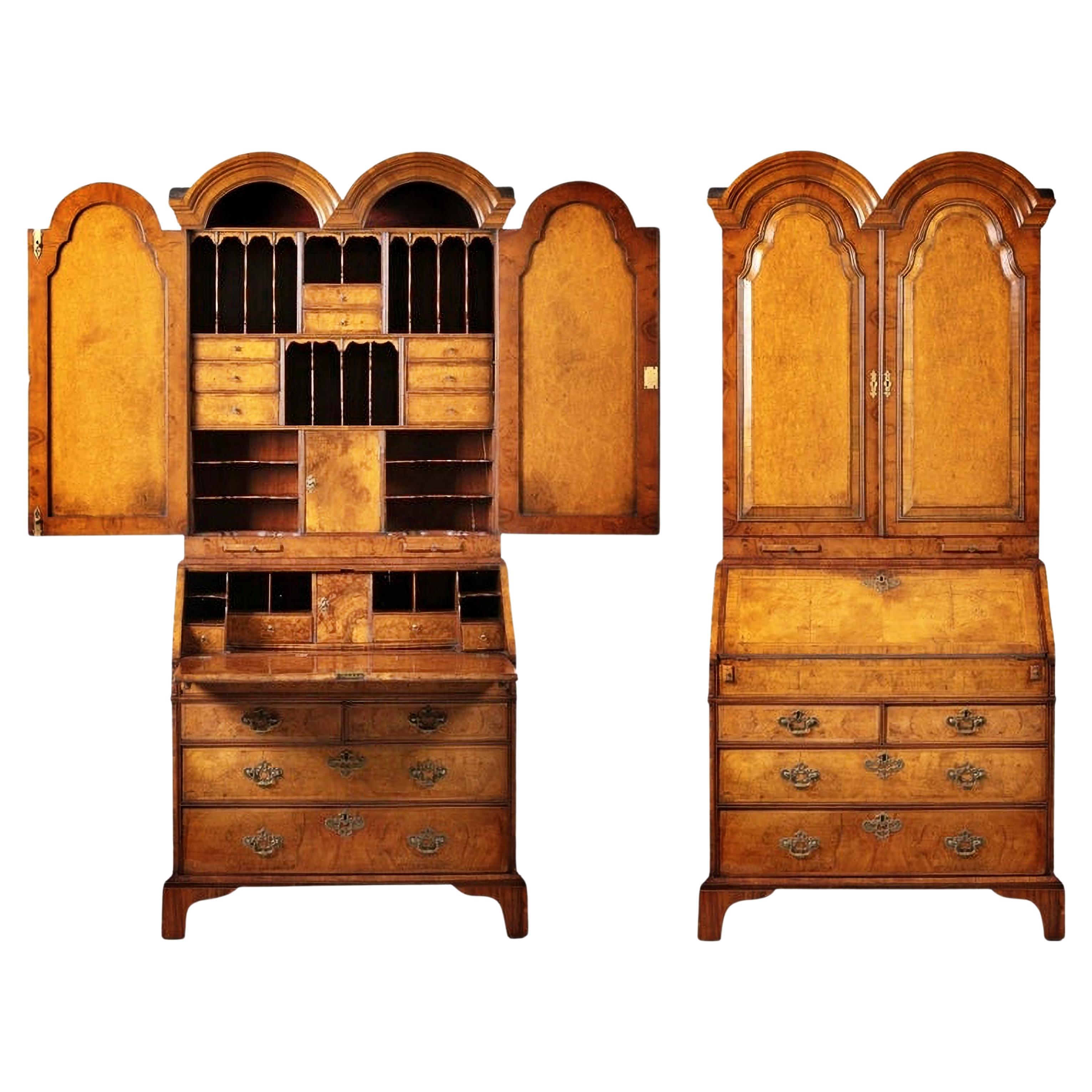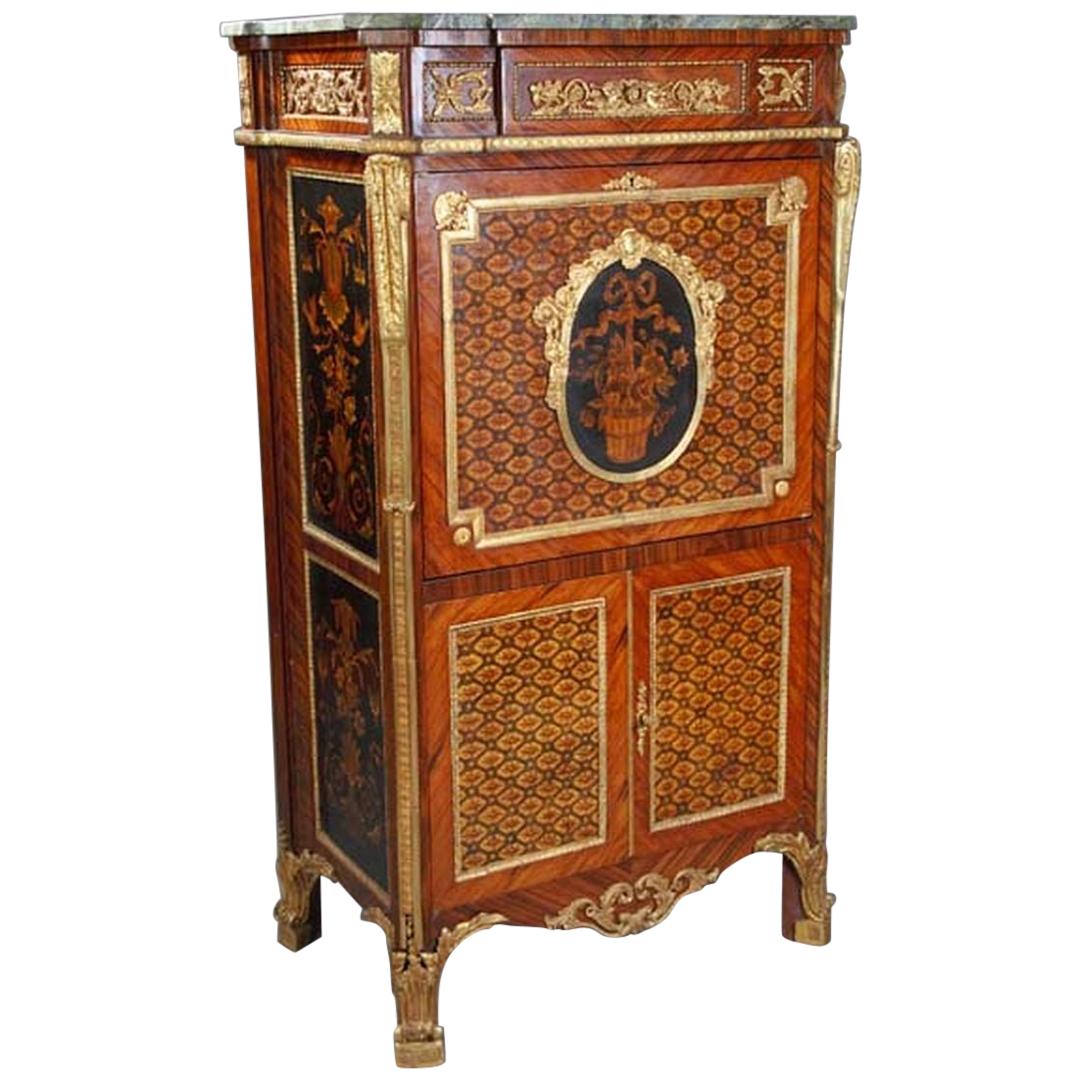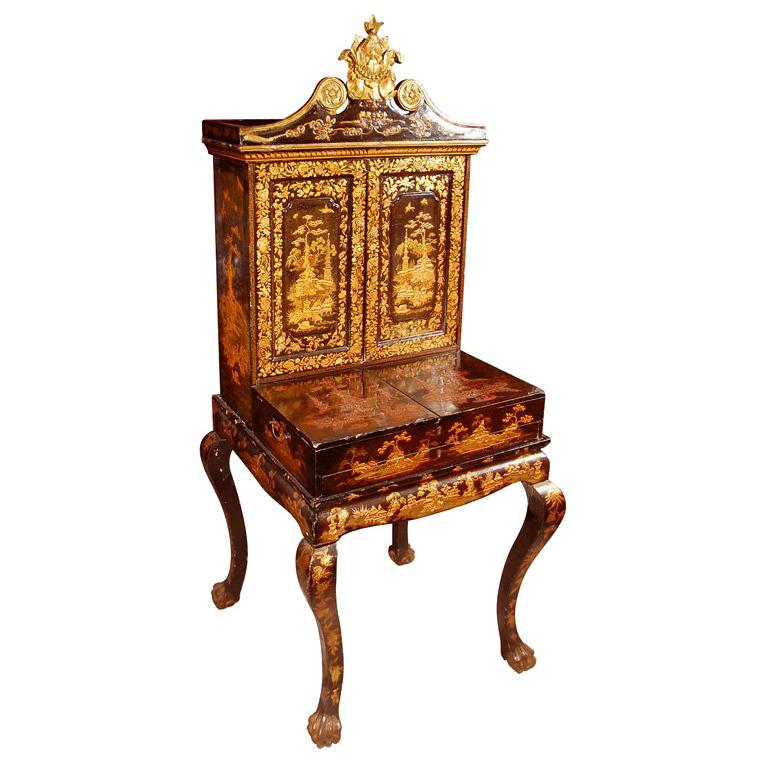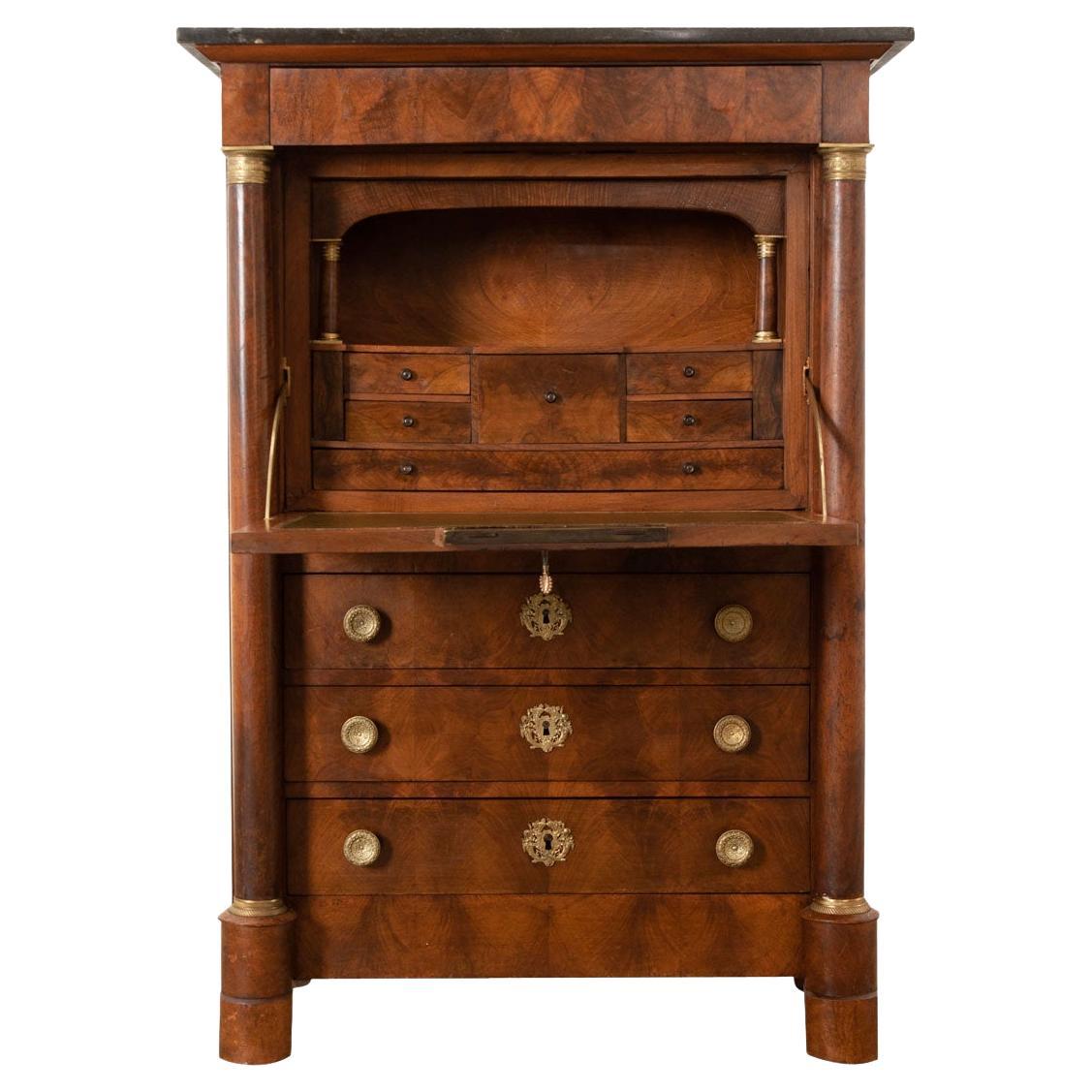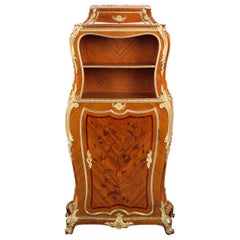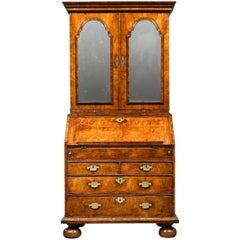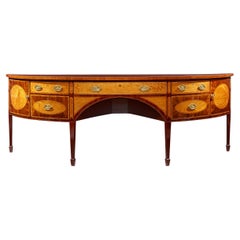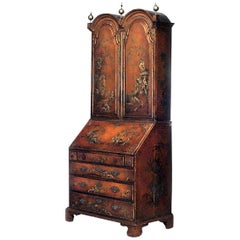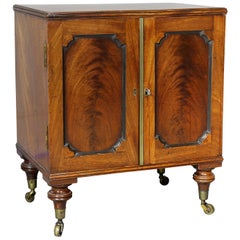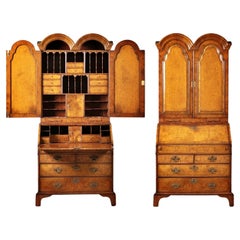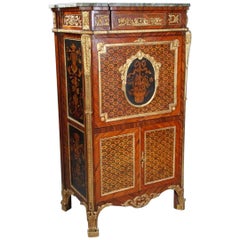Items Similar to King George I Ambassadorial Secrétaire-Cabinet
Want more images or videos?
Request additional images or videos from the seller
1 of 8
King George I Ambassadorial Secrétaire-Cabinet
$348,500
£263,223.40
€304,210.52
CA$488,824.57
A$543,698.47
CHF 284,560.13
MX$6,631,328.40
NOK 3,575,601.64
SEK 3,363,314.95
DKK 2,270,635.72
About the Item
This highly important secrétaire-cabinet was crafted for and specially ordered by King George I for the British Ambassador to Russia. From its craftsmanship and materials to its exceptional artistry, it is a work of royal and historic significance that exudes power in each and every detail. The broken pediment at its apex features the simplified royal coat of arms bearing the king’s crown, while the interior is adorned by portraits of the British Royal Family. Placed within the ambassador’s St. Petersburg home, this entirely unique piece of furniture would have been a potent reminder of England's grandeur and political importance.
Relations between England and Russia during this period were at an all-time high. Peter the Great had traveled to England in 1698 as part of his widely known “Grand Embassy” tour, wherein he attempted to gain foreign support against the Ottoman Empire. He spent a period of nearly four months there, meeting with King William III and his court on numerous occasions. Noted academic Arthur MacGregor wrote concerning the impact of the trip, “For two decades following Peter's visit, British influence in Russia reached a peak. It manifested itself in social custom, in craft practice and in ships and naval organization... it reached a significant sector of the population before relations cooled once again and the two nations pulled back from this era of unprecedented cordiality.”
First and foremost, however, it is a reminder of British might and influence. By the reign of King George I, England had come into its own as a world power. Unique in its design, this cabinet is a reflection of the country’s might. It is crafted from the highest-quality solid walnut and burr walnut adorned by gilded lock plates and engraved hinges. The presence of ormolu at its apex and lining the doors was a rarity for this period, and its addition makes manifest the importance of the design.
The outer doors open to reveal multiple interiors, including fifteen separate drawers around a central cupboard; the cupboard doors each bear mezzotint portraits of George I and his father, Ernest Augustus, Elector of Hanover. An etching after the portrait of George I dating to circa 1716 is in London’s Royal Academy. A second, inner pair of doors are adorned by mezzotints of the Prince and Princess of Wales (later Queen Caroline and George II), which are both after portraits by Sir Godfrey Kneller dated 1716 in the Royal Collection. A final portrait is revealed on the very interior of the cabinet, where a mezzotint of Frederick, Anne, Amelia and Caroline, children of the Prince of Wales, resides. An etching (circa 1715-1720) after this portrait can be found in the National Portrait Gallery (London).
Apart from its abundance of royal portraiture, the cabinet features stunning painted decoration, including floral designs as well as clouds, birds and trees in a bucolic motif reminiscent of Eden. Its lower portion is a study in both form and function, featuring a fitted secrétaire-drawer above three additional drawers for storage. The cabinet appears in The Shorter Dictionary of English Furniture by R. Edwards from 1964, a text that is regarded as the bible of British furniture design. Edwards describes it as a “writing cabinet...given by George I to the British Ambassador at the Russian court.”
The cabinet was likely made for the 18th-century German diplomat and writer Friedrich Christian Weber, who represented English interests at the Russian court from 1714 until 1719. Although Weber’s tenure as ambassador was relatively short, while in St. Petersburg, he authored his account entitled Das veraenderte Russland (The Present State of Russia), which was published in three volumes in 1721, 1739 and 1740. It may, however, also have been made for George Douglas, 2nd Earl of Dumbarton, who served as ambassador alongside Weber in 1716. Diplomatic relations ceased between the two countries in 1721.
In 1928, the cabinet appeared for sale at the International Exhibition of Antiques & Works of Art in Olympia. It had previously been in the collection of the Woltner family of Bordeaux, the celebrated vintners who owned the estate Château Laville Haut-Brion and produced wine of the same name. According to the family, Monsieur Woltner was given the cabinet as a gift from an aunt who lived in Russia for many years. After leaving the Woltner collection, the cabinet was acquired by William Berry, 1st Viscount Camrose, a Welsh newspaper publisher of significance.
Circa 1716-1721
Measures: 42 1/4" wide x 21" deep x 89 3/4" high
References:
The Dictionary of English Furniture, London, rev. ed., 1954, by P. Macquoid and R. Edwards, vol. 1, p.141, fig 41
The Shorter Dictionary of English Furniture, London,1 964, by R. Edwards, p.79, fig 25
Provenance:
Gifted by King George I to the Ministers Resident (Ambassador) to Russia
Monsieur Woltner, Château Haut Brion, Bordeaux, France
Edwards & Sons, 157 Regent Street, London
Sold at the International Exhibition of Antiques & Works of Art, Olympia, 1928
William Berry, 1st Viscount Camrose (d.1954)
Thence by descent
Private collection
M.S. Rau, New Orleans, 2003
Private collection, Ohio
M.S. Rau, New Orleans.
- Dimensions:Height: 89.75 in (227.97 cm)Width: 42.5 in (107.95 cm)Depth: 21 in (53.34 cm)
- Style:Georgian (Of the Period)
- Materials and Techniques:
- Place of Origin:
- Period:
- Date of Manufacture:circa 1716-1721
- Condition:General maint. and upkeep given the age of the piece.
- Seller Location:New Orleans, LA
- Reference Number:Seller: 31-36431stDibs: LU891126164792
About the Seller
5.0
Recognized Seller
These prestigious sellers are industry leaders and represent the highest echelon for item quality and design.
Established in 1912
1stDibs seller since 2010
111 sales on 1stDibs
Typical response time: 9 hours
- ShippingRetrieving quote...Shipping from: New Orleans, LA
- Return Policy
Authenticity Guarantee
In the unlikely event there’s an issue with an item’s authenticity, contact us within 1 year for a full refund. DetailsMoney-Back Guarantee
If your item is not as described, is damaged in transit, or does not arrive, contact us within 7 days for a full refund. Details24-Hour Cancellation
You have a 24-hour grace period in which to reconsider your purchase, with no questions asked.Vetted Professional Sellers
Our world-class sellers must adhere to strict standards for service and quality, maintaining the integrity of our listings.Price-Match Guarantee
If you find that a seller listed the same item for a lower price elsewhere, we’ll match it.Trusted Global Delivery
Our best-in-class carrier network provides specialized shipping options worldwide, including custom delivery.More From This Seller
View All19th Century French Secrétaire by Durand
By Gervais Durand
Located in New Orleans, LA
Superior craftsmanship and intricate marquetry characterize this rare secrétaire by Gervais-Maximilien-Eugène Durand, one of the most popular French ébénistes of the 19th century. Th...
Category
Antique 19th Century French Louis XV Secretaires
Materials
Bronze, Ormolu
Louis XIV Inspired French Linen Press
Located in New Orleans, LA
Enveloped in sumptuous parquetry and doré bronze, this majestic Louis XIV inspired French linen press displays the characteristics of superior craftsmanship and luxurious design seen in the creations of the iconic Françios Linke. Crafted of sumptuous kingwood, the glorious parquetry door opens to reveal six compartments used to store linens, such as those for the bedroom or even the dining table. The masterful woodwork is flawlessly balanced by intricate doré bronze mounts in the form of Neoclassical floral swags, garlands, plumes and acanthus scrolls. The delicately spiraled doré bronze feet give the cabinet a sense of lightness and balance. Enhanced by a beautiful rouge marble top, this elegant linen press is an excellent example of late 19th century French furniture...
Category
Antique 19th Century French Louis XIV Linen Presses
Materials
Bronze
18th Century English Secretary
Located in New Orleans, LA
Queen Anne period furnishings such as this walnut secretary are incredibly rare and important examples of English cabinetmaking. This secretary is of the most outstanding caliber, boasting desirable double bonnet, mirrored cabinet doors...
Category
Antique 18th Century English Queen Anne Secretaires
Materials
Walnut
George III Mahogany And Satinwood Sideboard
Located in New Orleans, LA
This magnificent demi-lune Georgian sideboard displays the pinnacle of the era’s refined craftsmanship and boasts a distinguished provenance. Crafted of the finest mahogany, the era's timber of choice for well-appointed manor homes, the sideboard is inlaid with satinwood marquetry and crossbanded with tulipwood, one of the most coveted species of rosewood. Tulipwood is prized not only for its durability but also for its innate beauty. The sideboard features its original brass pull handles and knobs.
Illustrating the caliber of its exquisite craftsmanship, this large demi-lune sideboard was once housed in one of the most illustrious grand manor homes of the era, Hackwood Park...
Category
Antique 18th Century English Georgian Sideboards
Materials
Brass
Mahogany Bureau Cabinet After Thomas Chippendale
By Thomas Chippendale
Located in New Orleans, LA
This extraordinary Irish bureau cabinet was crafted based on a design for a desk and bookcase drawn from Thomas Chippendale’s famed 1762 edition of The Gentleman and Cabinet-Maker's ...
Category
Antique 18th Century Irish Chippendale Cabinets
Materials
Mirror, Mahogany
Louis XVI Commode by Pierre Roussel
By Pierre Roussel
Located in New Orleans, LA
Matchless style and high-quality craftsmanship are the hallmarks of Pierre Roussel's furniture, and this exceptional Louis XVI-era commode epitomizes this master craftsman's skill. Crafted of rosewood veneer with a violet wood frame and intricate parquetry inlay, the cabinet's graceful design is also highly practical. The compact form holds two drawers, one of which can be locked for added security. A specimen of marble provides the perfect surface, while bronze ormolu mounts add an additional hint of luxury to the drawers and body. Elegantly curved cabriole legs with bronze ormolu shoes complete this impeccable piece.
Known for his superior craftsmanship, Roussel was a highly respected maître ébéniste of the 18th century. His furniture pieces were favoured by grand patrons such as the Prince de Condé and the Princess of Monaco...
Category
Antique 18th Century French Louis XVI Commodes and Chests of Drawers
Materials
Marble, Bronze
You May Also Like
English Georgian Style Secretary Cabinet
Located in Queens, NY
English Georgian style (19th century) red lacquered Chinoiserie decorated slant front secretary cabinet.
Category
Antique 19th Century British Georgian Secretaires
Materials
Wood
George III Mahogany Collectors Cabinet
Located in Essex, MA
Rectangular top over a pair of paneled doors enclosing adjustable shelves, raised on turned feet and original casters. Provenance; Norman Adams Ltd. Londo...
Category
Antique 1790s English George III Cabinets
Materials
Mahogany
Rare and Important English Cabinet George I in Partridge's Eye 18th Century
By English School
Located in Madrid, ES
George I cabinet with elevation
English, in mahogany and partridge's eye
18th Century.
Top with two interior doors with drawers, door and bins.
Bottom with two drawers and two bi...
Category
Antique 18th Century English George I Cabinets
Materials
Wood
$33,372 Sale Price
20% Off
20th Century Unique French Secretary in Louis XVI Style
Located in Berlin, DE
Various veneer on solid wood. Built by the Ebenisten Jean Henri Riesener. High rectangular body. In the front two doors. Behind the writing board is an architecturally richly structu...
Category
20th Century French Secretaires
Materials
Wood
19th c. Georgian Style Secretary
Located in Los Angeles, CA
England: Georgian style black lacquered Chinese export small secretary with gilt figural scenes
Category
Antique 19th Century English Secretaires
Materials
Giltwood, Wood
Price Upon Request
French Empire Secrétaire á Abattant
Located in Baton Rouge, LA
A handsome 19th century French Empire secrétaire à abattant made of richly figured, bookmatched walnut. This desk has a black fossil marble top resting above a hidden drawer, free of hardware and opening by a shallow groove on the bottom of the drawer front. Below is a fold-front door revealing a fitted interior with a functional writing surface, inset with worn green leather with gold tooling. The interior has an open storage shelf flanked by Empire style columns over a set of six drawers of varying sizes. The writing surface is supported with rounded brass hinges. Below are three easy to use drawers...
Category
Antique 19th Century French Empire Secretaires
Materials
Marble, Brass
More Ways To Browse
George Peter
King George Furniture
George Earl
Used Furniture Prince George
Brass Bear Antique
King George Ii
Antique English Dictionary
Chateau Plates
Antique British Doors
Solid Brass Bird
Brass Etching
King William Iii
Brass Wine Cabinet
Antique Brass Name Plate
Carved Bird Tree
Russian Bear
Antique French Bible
French Chateau Doors
